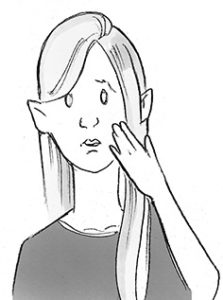There are three significant developments in these two chapters:
- Xenia’s second attempt — first unsuccessful, and then successful — to get CJ’s watch and Shar’s bracelet
- Finally hearing the whole story about Ms. Weeks’ family mystery
- The alarming scene that takes place between CJ, Charlie and Mr. Rogers
All three have impact on coming events, so let’s look at them in this order.
Photini to the rescue
 On the drive in to Mrs. Higg’s meeting at their social hall, Photini asks Xenia why she didn’t pick someone else to come along, and Xenia is frustrated to have to explain.
On the drive in to Mrs. Higg’s meeting at their social hall, Photini asks Xenia why she didn’t pick someone else to come along, and Xenia is frustrated to have to explain.
“Not only do you know me best,” she said, “but out of all of us in the Club, you’re the most churchy.”
“Why do you keep saying that? I don’t even know what that means.”
“Yes, you do,” Xenia argued. “You know all about prayers and church services and stuff. You’ve read more of the Bible than any kid I know, and you do it because you actually like it. It’s just the way you are, but it gives you a really strong sense of right and wrong. … So, I need your help. All the same, don’t lose focus. … our most important job is just getting Sharleen to lend me that charm bracelet.”
“How am I supposed to do that?”
“How do I know? Pray. Quote Bible verses. Do what you’re good at.”
Photini studied her nails again, and the car’s head rest, and even the pigeons pecking in the parking lot. Suddenly, what she was good at didn’t fill her with confidence. (pages 227-229)
And at first, it looks like she might have been right. Even though she gets off to a promising start with Shar, things begin to deteriorate when she’s uncomfortable with talk about psychic and occult practices Mrs. Zell engages in. Even that wouldn’t be so bad, however, if Photini didn’t slip up and let her priggish side get the better of her.
“You shouldn’t use such filthy language. People will think you’re a skank.”
Xenia, who had been looking for some way to interrupt, drew in a quick breath. And Shar, with a slow, deliberate movement, stopped unfastening her bracelet and lifted her gaze until her eyes rested coolly on Photini.
“Why would … anyone … call me a skank?” she inquired frostily, lifting both eyebrows. (pages 234-235)
And that, for Shar — who by the way, really does seem rather skanky — is the unforgiveable sin. She withdraws the offer and all seems lost.
As I’ve said before, I really like writing Photini scenes. She has a painfully obvious kind of goody-goody streak that makes her easy to parody and lends itself to comic relief. But I always mean to convey at the end of it that, almost in spite of herself, Photini has some actual piety. Maybe not as much as she pretends to have. But enough so that, in this disastrous outcome when Xenia assumes all is lost, Photini does two things that only she would do. And they are perhaps the only two things you can do, to mend a casual relationship that has gotten off to such a terrible start.
For one thing, she exercises some real humility. The first thing she does is to “go inside” — even in the middle of a crowded group — and seek to repair some brokenness by putting herself in a prayerful state. That leads to the second real act of humility — actually apologizing, as one teenager to another, with no strings attached. (For the record, I don’t ever recall seeing such a thing when I was this age. I would have been completely amazed, if I had.)
And it’s these actions that lead to the second breakthrough, which is only partly Photini’s doing, but which she is strengthened by. Sharleen, who is the type of person who really does pick up on a lot — if usually in a rather shrewd, crafty way — sees that Photini is a kindred spirit. Neither one of them have a dad in their life. And as a kindred spirit, Shar makes one abbreviated comment, which wouldn’t mean much if it didn’t come from a fellow sufferer:
“Sucks, doesn’t it?”
Photini didn’t usually care for that expression, but under the circumstances, she was too moved to do much more than nod. “Yeah. It does.” (page 254)
This enables her to see the humanity in Sharleen, who she really had been holding in rather low esteem. That’s what allows her to take the step of apologizing, and that, as we know, is how Photini actually saves the day.
As a brief aside, people ask me sometimes how I come up with my ideas and how I work out all these little subplots in the books. I’m pretty typical, I think, in having to report how seldom I know the answer (in the first case) or have a clue what I’m doing (in the second). Since we’re at the conclusion of this small subplot, I’ll report that when I was putting together this part of the story, I only knew that Xenia should have some little task to do. And it needed to look simple, but actually be rather complex. I had a kind of placeholder idea of her getting items away from the two most obnoxious Society members, and when it came time to write that part, I found that I couldn’t really improve on the idea. As odd a notion as it was, it actually went right to the heart of what Xenia just wasn’t good at — persuading people to do any little thing for her, just for the sake of friendliness. Even Photini just barely pulled it off. For a little mystery, I think it’s actually the kind of thing that would be difficult for almost anyone.
The Weeks Treasure
 The Society’s first big mystery, on the other hand, is something completely different. Not simple at all, given that people have been trying since 1870 to figure it out. And also not likely to be sorted out just by some kindhearted gestures and prayerful time. So it’s okay that Photini isn’t really in the picture for this part of things.
The Society’s first big mystery, on the other hand, is something completely different. Not simple at all, given that people have been trying since 1870 to figure it out. And also not likely to be sorted out just by some kindhearted gestures and prayerful time. So it’s okay that Photini isn’t really in the picture for this part of things.
There isn’t really a lot of analysis to give this portion. Hopefully, the facts that are laid out by Bobbi for the Society are easy enough to sort out. There will be more to say about all this as the Society begins in earnest to work out a little about Jessam Weeks and his possible motives. But the only thing that I’d like to add is that this take on Missouri’s history with the Civil War is, unfortunately, based on my observations from living there.
“But was he smuggling for the Union or the Confederates? Bobbi has so much stuff on her family — wouldn’t she be able to find that out?”
“That may not be as easy as you think,” her father told her. “A lot of these proud old families don’t exactly want to get into all that.”
Xenia stared at him. “But it was so long ago. No one cares now whose family was on which side, do they?”
“You’d be surprised. Some people still just don’t want to talk about it. The Civil War left deep scars in this area. Believe it or not, some of them still haven’t healed.” (page 246)
That was almost verbatim what a historian said to me, on the strange occasion I had once of running across him in an old cemetery. (Never mind for now what I was doing there.) We got into a discussion about the area and its history, in a very small town about an hour north of Kansas City. Very much a little old cow-town type of place — very Mayberry RFD (if that reference still holds up). He mentioned that there had actually been a small Civil War battle that had happened there, and I asked him why the town didn’t use the opportunity to drum up a little tourist business. He had a very wistful smile when he answered that there were some old families in that town that were still in denial over what had gone on in those days. “There were some assassinations,” he said. “But no one wants to talk about them.”
In that way, I think that Millennials and Gen-Z might have it easier. I’m not certain, but I think they would actually have an easier time turning loose of this baggage from the past. We have enough trouble with the sins we commit now. We don’t need to expend unnecessary energy trying to whitewash out the sins of the past.
In any case, try to keep the basic facts about the Weeks Treasure straight in your head. And of course, those special clues to be found in Jessam’s last words. They’ll come in handy.
‘I saw everything that happened!’
It’s been a long and informative evening, and in spite of that near-miss, Xenia does end up by getting the only thing she really wanted out of bringing along a Club member. She swoops in at just the right moment, grabs the watch and the bracelet, and clicks off two selfies for Mrs. Higg. Surely, a fine and victorious end to things.
But why is it, when things have run on a little too long and spirits are running high, things can come to such an odd turn of events, sometimes with so little notice? Xenia’s moment of triumph leads to a little bit of good-natured teasing, because CJ doesn’t seem able to cope. Why it should matter at all to him is something we can just lay aside for right now, but it’s obvious that this immature and combative tweener is suddenly bent on causing as much damage as he can to whoever he can. He happens to pick on Charlie, perhaps because he is the most stung by Charlie’s lack of respect for him.
From one bizarre accusation to another, CJ seems to be aiming darts at Charlie, just to see if he can get anything to stick. In the space of a minute, he goes from accusing Charlie of wanting to kill him to killing and burying a dog. And then just falls into some blanket assertion that he saw “everything that happened.” All based on the story — plausible but not provable — that he went over to the Rogers’ farm the preceding Friday afternoon and climbed up in the treehouse.
The girls are merely confused — by the charges, and by the confrontation that unfolds so quickly — but Charlie reacts instantly and with fury.
Having found some kind of mark, CJ doubles down, adding more strange accusations, hardly even seeming to hear what he’s saying. And even after Mr. Rogers arrives on the scene, CJ seems incapable of letting things go. Charlie’s dad seems to instantly be at a loss. He has already said that he is sometimes afraid of Charlie. Does he have some reason to be afraid that something CJ is hinting at is actually true?
And what is CJ getting at? Is there something in all this that is more dangerous than he realizes?
Obviously, we’re not going to find out for a bit. The scene boils over until Mr. Rogers merely shouts his son’s name, and that is the moment that freezes the trio for an instant.
Staring in horror at this surreal tableau, Xenia has a terrible feeling that whatever just happened has ramifications for her as well.
She’s right.
Coming up (I’ve decided to split up the next two chapters):
Chapter 16: In which much is revealed
Chapter 17: Back to Ms. Weeks’ farm, where a promising conversation with Charlie takes an unexpected turn
